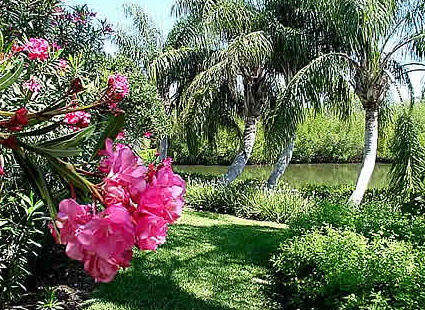Landscape Design

A new garden concept instituted to maintain and to preserve the mangroves and their eco-system</strong
Less than 50 years ago, residential developers were of the belief that wetland property had to be dredged and filled to remove all water and vegetation to enhance marketability. Today, we know that our wetlands are valuable eco-systems, supporting a variety of life and should, if at all possible, be maintained. These wetland environments, surrounded by mangroves, nurture and sustain virtually all of our estuary and near-shore marine food and recreational fish. The prop roots of the mangroves hold the shorelines safe from the violence of storms as well as allow new land masses to form within their root systems. And, we have learned the hard way, that when the mangrove fringe is indiscriminately removed, flooding and land erosion quickly follow.
Fortunately, these eco-systems can be preserved. We can co-exist - the mangroves and mankind - adding to the environment as opposed to destroying what is so important to the health of our rivers, estuaries and oceans by re-evaluating our needs and adopting a new philosophyy.
By adapting our development goals and desires to what the wetlands need, by becoming familiar with and working within the wetlands, we have found that one can live and garden within this environment without upsetting the delicate balance. In developing The Mangrove Gardens, we protected and improved the environment by removal of invasive species, i.e. pepper trees, Australian pines and vines - and - by instituting controlled periodic pruning/trimming of the mangroves the health of the wetlands has greatly improved and the result is a more productive, natural environment.
Garden beauty comes in many different forms. By working with the environment and incorporating the mangroves and the spoil islands left behind by the Army Corps of Engineers in the 1950's, a unique and exotic garden has evolved. By example, it has become a tool with which to educate individuals and groups who visit - we can only hope that each and every visitor learns that with careful planning, each of us can do our part to preserve and enhance these areas so they can flourish not only now but for all time.